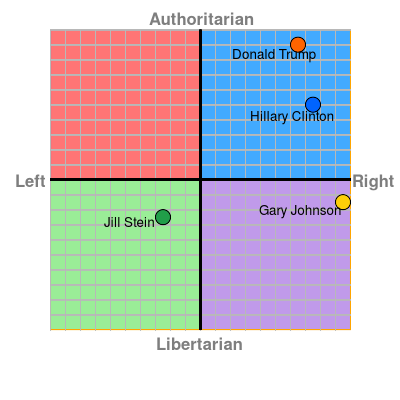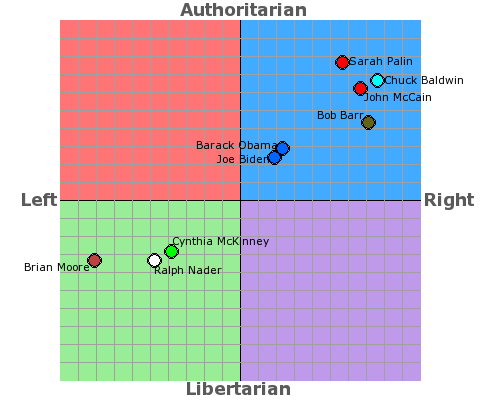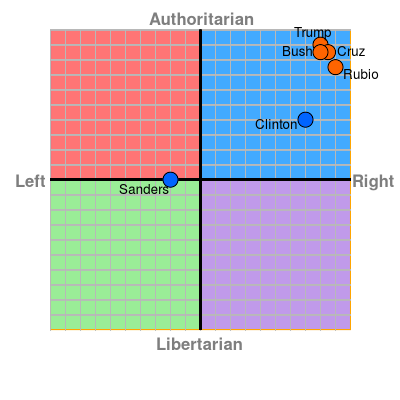Aielyn said:
It would help if you actually knew what you were talking about. Communism is neither the most extreme left-wing, nor is it about control. Indeed, what communism is about is found in its name - "commune". It's about the sharing of wealth and localisation of government. I'm betting you think that China and Russia are (or at least were) communist - they're not, and haven't been within the modern era at least. They're socialist, not communist. Anarchy is in no way a right wing ideal. More generally, it's NOT a "left is about control, right is about freedom" thing at all. Otherwise, the far right wouldn't be wanting to ban abortion, gay marriage, gay adoption, interracial marriage, immigration, etc. Indeed, the "wings" refer to the overarching approach to economic issues. The left wing believes in the people collectively having responsibility over the means of production, the right wing believes in the means of production being under the control of those who have proven themselves most capable. These are the "in theory" concepts of the two. To the far left, you find communism and, a little beyond that, anarchism. To the far right, you find capitalism, and beyond that, fascism. Of course, this is the simplistic way of characterising things. A more accurate way to capture the concept is to use the "two-dimensional" approach, as seen in sites like "political compass". The simplest way to understand this approach is that it separates two different kinds of "freedom/control" logics. On one axis, you find economic control (regulation) vs economic freedom ("free market"), while on the other axis, you find social control (authoritarianism) vs social freedom. The "far right" capitalism would fall under the extreme "economic freedom + social control" combination in one corner. In the opposite corner, you'll find communism. Freedom on both axes is anarchism, while control on both axes is fascism. To give a sense of how powerful this separation is in truly understanding things, consider the Nazis. They weren't especially economically liberal or conservative. Indeed, on the economic axis, they were quite centrist. But they were very, very authoritarian. This is why you often hear arguments between people about whether the Nazis were left or right wing - effectively, they were neither. Libertarians lie not far from anarchists, in the corner with "freedom" on both axes. Note that most of the American 'left wing' is actually right-of-centre, as the world would judge it. And Donald Trump is actually less in favour of the free market than Hillary Clinton - this image may help you to calibrate how it all lies:
And let's be clear - this axis isn't skewed in favour of putting the "left" in the centre. Here's the equivalent chart for 2008:
Also note that "libertarian" on the bottom isn't referring to the US political movement, which is actually what you might call the "libertarian right". Oh, and here's one more - this is 2016 Democratic and Republican primary delegate-winners:
These were the positions that the candidates were in during the primaries (notice that Trump moved to the centre on economic issues because he didn't have to focus so much on the base, while Clinton moved slightly to the right because she no longer had to deal with Sanders?). ---- But then, given much of the rest of what you said, it's clear that your definitions of "left" and "right" roughly equate to "people I agree with are right, and people I disagree with are left". Otherwise, you wouldn't be lumping far-right authoritarian religious groups that want the government to get out of their pocket with far-left hippy government-should-fund-my-lifestyle-whatever-that-is types. They're literally polar opposites on every single issue, and you consider both to be "left" because they're both somehow about "control". |
"It's about the sharing of wealth"
how do you share/distribute wealth without control?
"Otherwise, the far right wouldn't be wanting to ban abortion, gay marriage, gay adoption, interracial marriage, immigration, etc."
what makes you think those are policies coming from a right wing perspective?
"To the far left, you find communism and, a little beyond that, anarchism"
lol so you think anarchism is on the same side as communism? that's quite interesting to say the least... how from your view does communism develop into anarchy?
"Otherwise, you wouldn't be lumping far-right authoritarian religious groups that want the government to get out of their pocket with far-left hippy government-should-fund-my-lifestyle-whatever-that-is types. They're literally polar opposites on every single issue"
how can they be polar opposites on every issue when you yourself say here that one group is authoritarian while another group wants a larger government?
"given much of the rest of what you said, it's clear that your definitions of "left" and "right" roughly equate to "people I agree with are right"
lol based on what? that's an odd comment





























































